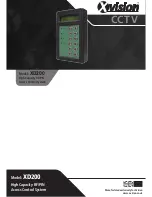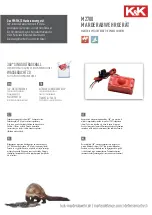
Page 1 of 13
#45030 05-07
INTRODUCTION TO SURGE BRAKING
Surge braking is accomplished by replacing a trailer's standard tongue coupler with an actuator and adding hydraulic
brake assemblies. The "surge" or "push" of the trailer toward the tow vehicle during deceleration automatically
synchronizes these trailer brakes with the tow vehicle brakes. As the trailer pushes against the vehicle, the actuator
telescopes together and applies force to its master cylinder, supplying hydraulic pressure to the trailer's brakes.
Surge actuators of this type provide a service life of approximately five years with proper installation, usage, and
maintenance. However, a well cared-for actuator can often exceed this estimate. To get the most benefit from your
TITAN surge actuator, follow the instructions given in this manual and use common sense in caring for the TITAN
AERO 7500 actuator and your entire trailer brake system.
RATED CAPACITY AND USAGE
7,500 POUNDS MAXIMUM GROSS LOAD
(weight of trailer fully loaded with all cargo and equipment). To find your
trailer's Gross Load, use a commercial vehicle scale at a truck weigh station, grain elevator, etc.
700 POUNDS MAXIMUM TONGUE LOAD
(weight applied downwards by the fully loaded trailer's coupler onto the tow
vehicle's hitch). Measure your trailer's Tongue Load with the tongue in the horizontal towing position, using either a
commercial scale or a bathroom scale if the load is small enough. Upwards tongue loads are not permissible.
INSTALLATION INSTRUCTION AND SERVICE MANUAL
Actuator/Trailer Dealer - Please provide these instructions to the consumer.
Consumer - Read and follow these instructions. Keep them with the trailer for future reference.
TITAN
AERO 7500
ACTUATOR FOR TRAILER BRAKES
The AERO-7500 actuator is intended for use on recreational, marine, and agricultural
occasional-use trailers, which are towed by passenger cars or pickups. Use
ONLY with
a two inch (2") diameter tow ball
. The actual in-service rating is limited to that of the
ball and hitch being used or the trailer manufacturer's G.V.W.R. shown on the
certification label, whichever is lower.































